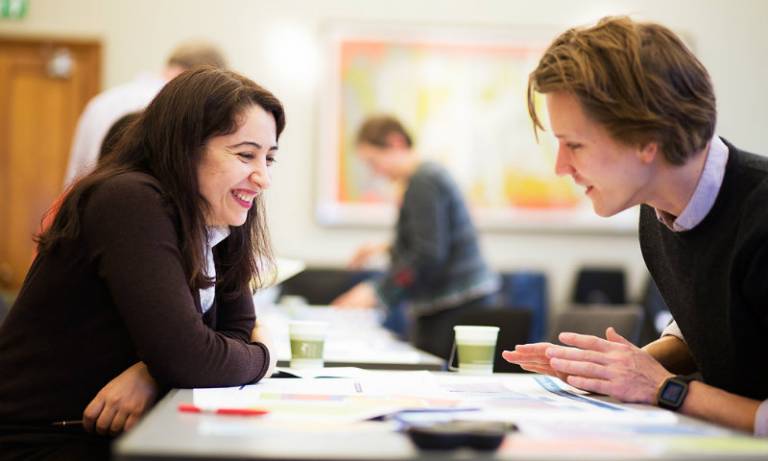Personal tutoring in UCL History delivers full overview of student progress
Undergraduate students in the History department benefit from structured conversations with their personal tutor at key milestones in their first year at UCL. Cari Tuhey (Departmental Tutor) explains.

24 January 2017
With around 600 undergraduate students and 32 permanent and long-term academic staff taking on responsibility as personal tutors, UCL History has successful adopted an effective light touch approach to personal tutoring, academic support and personal welfare.
Consistency and meetings that support milestones in the academic year
“Feedback from our students over the years has shown us that students want the same tutor for the duration of their undergraduate degree and for that person to be an effective first port of call, even if that means pointing them to further or alternative sources of help and support.”
The department highlights five weeks throughout the first academic year (which align with key milestones in the undergraduate first year) in which staff are expected to initiate meetings with their tutees and discuss these important moments.
Currently these are:
- Term one: two meetings covering induction week and the end-of-term academic progress report
- Term two: one meeting for the end-of-term academic progress report
- Term three: two meetings covering module selection week for the next year and exam preparation
There are plans to review the suitability of these in the future as students’ needs change.
Personal tutors have the information they need to provide effective support
All personal tutors are involved in undergraduate teaching, which means they have knowledge of the expectations and workloads of their tutees and are well placed to offer academic guidance.
Central support services are also made clear to staff, including guidance on when, how and to whom to refer their tutees.
Staff are sent a guidance pack covering all personal tutoring requirements and related policies at the start of the year and, in advance of themed tutorial weeks, receive an email with useful links and suggestions about questions to ask or potential areas for discussion.
Using student feedback to develop the support
Personal tutors are expected to meet with each of their tutees at least 5 times a year. Most students engage with their tutors, although some choose not to.
The department has recently tried to use feedback from its end-of-year questionnaires to address this, looking at ways to make the tutorial meetings more purposeful and to improve communication with students about benefits of the personal tutoring system.
Connecting new students with their personal tutors before they start at UCL
One recent initiative has been met with very positive feedback. Before arriving at UCL, first-year students are sent a questionnaire to be completed before their initial tutorial meeting.
They are asked to outline:
- their previous education
- which areas of history they’ve studied and are interested in
- what they hope to study during their degree
- reflective questions such as what they are looking forward to or worried about.
Feedback from personal tutors suggests that having time to review these questionnaires before the tutorial helped give context to their first meeting with the student and made the conversations more productive and enjoyable.
Students also seem pleased that they had had the opportunity to communicate with their tutors in advance and that they were able to engage in a meaningful discussion.
Using skills grids to provide structure
Students also complete a ‘skills grid’ as part of this pre-arrival questionnaire, following a model that has been used successfully by the UCL Institute of Archaeology for a number of years.
- A personal tutor in Archaeology talks about their experiences and provides example documents to download
This exercise encourages students to think about their personal and professional development by highlighting strengths and weaknesses, and begins a discussion with their personal tutor that will hopefully continue throughout their time in the department.
MyFeedback and progress reports give personal tutors insights
Personal tutors also have access to module leaders’ termly progress reports on each student. The report system has recently been moved to Moodle to take advantage of the new MyFeedback dashboard, which we hope will improve the accessibility of reports to both students and their personal tutors.
We try to offer all our students individual, targeted advice and support during their time with us and one of the most effective ways we do this is through the personal tutoring system. Our students tell us that they appreciate having at least one member of staff who is there to offer guidance throughout their entire programme, someone who has an overview of their experience and takes an interest not just in their academic progress, but in their welfare, personal development and plans for the future.”
 Close
Close

